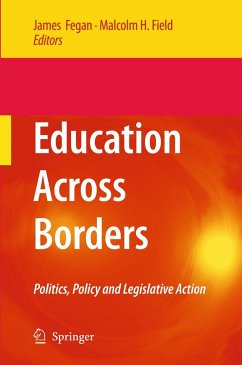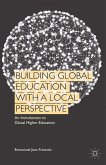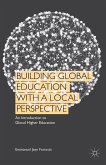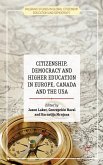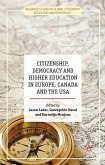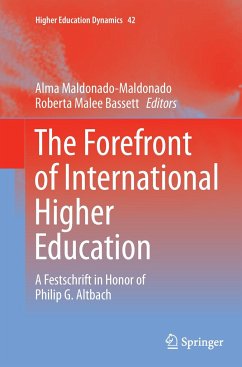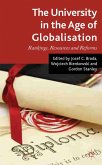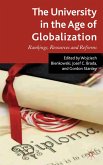With contributions from world-renowned experts with years of collective experience in "across-border" education, this volume focuses on the implications of globalization in higher education. In particular, it looks at relations between states and institutions that do not normally attract attention. The chapters analyze the interactions between the South and the North, consider the challenges for "non-elite" institutions, and examine the potential for knowledge flow and creation in across-border partnerships.
Higher education in nearly every corner of the globe is facing pressures to participate in a growing and interconnected international community of researchers, students, administrators and governmental and non-governmental organizations. Developing "world-class" educational institutions is an admirable aim, but without grass-roots reform in other areas, such as basic education, management and leadership, it could backfire. "Across-border" education is inevitable, but how states and institutions approach the opportunities will affect the rewards reaped.
The editors' aim has been to bring to the discussion the voices of experienced administrators and scholars who have been working to increase and improve the opportunities for cross-border education. The expert authors are not merely providing a collection of theoretical notions, but real insight into the politics, policies and legislation that surround cross-border interactions.
"In Education Across Borders: Politics, Policy, and Legislative Action more than twenty leading research scholars, educators, and administrators explore critical issues affecting cross-border education in Asia, Europe, Africa, and the Americas. Among the many thought-provoking topics analyzed are the inevitability of crossing borders in higher education, scientific capacity building in Latin America, and computer mediated learning between developed and developing countries. In each of the chapters the practical educational, administrative, and political implications of cross-border developments in higher education are explored, with an eye to offering suggestions for enhanced future access to education for young people around the world."
Dr. Martin C. Collcutt, Professor of East Asian Studies & History, Princeton University, USA
"As a member of a generation that had few chances to study overseas, I am committed to education across borders, in all senses, for Waseda University itself, and for students and researchers of countries large and small. After reading Education Across Borders: Politics, Policy and Legislative Action, I am encouraged that there are such committed administrators, scholars, and educators (several of them at Waseda) exploiting their own experiences to build the future. I recommend this book to the most diverse possible readership for its authority, breadth, and good sense."
Dr. Katsuhiko Shirai, President, Waseda University, Japan
The Universal Declaration of Human Rights endorsed in 1948 by member states of the United Nations continues to remain very much valid as it provides the solid foundation for most actions and activities that are aimed at guaranteeing the rights of everybody. The rights enunciated in the Declaration are comprehensive and two that are relevant to the content of this book are the right to education and the right to learn. The right to education and the right to learn are known to have been hotly debated by politicians, policy makers, and implementers. Sometimes, the rights in question here have found their way into political parties' manifestoes, and advocates oftherighttoeducation andtherighttolearnhavebeenquicktobringintojudgment politicians who have not lived up to their promises. Even at that, many member states of the United Nations have taken steps to ensure that access to learning is jealously guarded. For education and lifelong learning remain among the primary forces that can guarantee individual, community and national development, as they had always been from time immemorial. Globally, there has been ample evidence of efforts made by governments to p- mote the widening of access to participation in learning activities. Even so, the literature on the subject of access and participation has not captured suf ciently what has happened across the world in terms of providing access outside national boundaries in the context of globalization and the rapid creation of the knowled- based economies of the 21st century.
Higher education in nearly every corner of the globe is facing pressures to participate in a growing and interconnected international community of researchers, students, administrators and governmental and non-governmental organizations. Developing "world-class" educational institutions is an admirable aim, but without grass-roots reform in other areas, such as basic education, management and leadership, it could backfire. "Across-border" education is inevitable, but how states and institutions approach the opportunities will affect the rewards reaped.
The editors' aim has been to bring to the discussion the voices of experienced administrators and scholars who have been working to increase and improve the opportunities for cross-border education. The expert authors are not merely providing a collection of theoretical notions, but real insight into the politics, policies and legislation that surround cross-border interactions.
"In Education Across Borders: Politics, Policy, and Legislative Action more than twenty leading research scholars, educators, and administrators explore critical issues affecting cross-border education in Asia, Europe, Africa, and the Americas. Among the many thought-provoking topics analyzed are the inevitability of crossing borders in higher education, scientific capacity building in Latin America, and computer mediated learning between developed and developing countries. In each of the chapters the practical educational, administrative, and political implications of cross-border developments in higher education are explored, with an eye to offering suggestions for enhanced future access to education for young people around the world."
Dr. Martin C. Collcutt, Professor of East Asian Studies & History, Princeton University, USA
"As a member of a generation that had few chances to study overseas, I am committed to education across borders, in all senses, for Waseda University itself, and for students and researchers of countries large and small. After reading Education Across Borders: Politics, Policy and Legislative Action, I am encouraged that there are such committed administrators, scholars, and educators (several of them at Waseda) exploiting their own experiences to build the future. I recommend this book to the most diverse possible readership for its authority, breadth, and good sense."
Dr. Katsuhiko Shirai, President, Waseda University, Japan
The Universal Declaration of Human Rights endorsed in 1948 by member states of the United Nations continues to remain very much valid as it provides the solid foundation for most actions and activities that are aimed at guaranteeing the rights of everybody. The rights enunciated in the Declaration are comprehensive and two that are relevant to the content of this book are the right to education and the right to learn. The right to education and the right to learn are known to have been hotly debated by politicians, policy makers, and implementers. Sometimes, the rights in question here have found their way into political parties' manifestoes, and advocates oftherighttoeducation andtherighttolearnhavebeenquicktobringintojudgment politicians who have not lived up to their promises. Even at that, many member states of the United Nations have taken steps to ensure that access to learning is jealously guarded. For education and lifelong learning remain among the primary forces that can guarantee individual, community and national development, as they had always been from time immemorial. Globally, there has been ample evidence of efforts made by governments to p- mote the widening of access to participation in learning activities. Even so, the literature on the subject of access and participation has not captured suf ciently what has happened across the world in terms of providing access outside national boundaries in the context of globalization and the rapid creation of the knowled- based economies of the 21st century.
"Daily, more and more higher education is crossing borders of space and time. Students are traveling abroad for education, or linking themselves to the world via the internet. Teachers are migrating from one continent to another. Transnational projects between educational systems in different countries are expanding. In Education Across Borders: Politics, Policy, and Legislative Action, James Fegan, Malcolm Field and more than twenty other leading educators, administrators, and researchers from across the globe examine the recent achievements of, and obstacles to, cross-border education, and assess future possibilities and problems. These thoughtful, practical essays remind us that education is not steady-state, and that the changes we are seeing in our local schools and universities are linked inevitably to developments in the wider world of trans-national education." -- Martin C. Collcutt, Professor of East Asian Studies & History, Princeton University, USA
Daily, more and more higher education is crossing borders of space and time. Students are traveling abroad for education, or linking themselves to the world via the internet. Teachers are migrating from one continent to another. Transnational projects between educational systems in different countries are expanding. In Education Across Borders: Politics, Policy, and Legislative Action, James Fegan, Malcolm Field and more than twenty other leading educators, administrators, and researchers from across the globe examine the recent achievements of, and obstacles to, cross-border education, and assess future possibilities and problems. These thoughtful, practical essays remind us that education is not steady-state, and that the changes we are seeing in our local schools and universities are linked inevitably to developments in the wider world of trans-national education.
Martin C. Collcutt, Professor of East Asian Studies & History, Princeton University, USA
Martin C. Collcutt, Professor of East Asian Studies & History, Princeton University, USA

